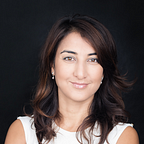Why Your Identity is Nothing to Be Ashamed Of — Uncovering Racism and Discovering Dignity
For years, I’ve worked around dignity — creating events and inspiring others to embrace their own dignity. Not only has it helped me to recognize dignity in others but also to manage the trauma, the pain, frustration and anger of my past.
As a teenager, I grew up away from my parents and my home country Uzbekistan in an adverse environment — even though I lived in one of the safest countries in the world. When I moved to Denmark as an 18-year old I wanted to be part of the society and not be singled out. I wanted to fit in.
I did not want to be Fatima
I refused to wear colorful dresses, bold earrings or anything that would have been considered “ethnic”. I did not want to be labeled. I talked about this publicly at a youth professional event for Taitaja-Global Dignity 2017 in front of 1,600 people. Global Dignity is a NGO now present in 80 countries, also in Uzbekistan.
“I did not wear big bold patterns on my dress because I didn’t want to be Fatima”, I told them. My voice shivered when I said it and I was ashamed. But in this moment I had finally come clean about my own shame of being different.
I know that millions of women out there struggle with the pressure and guilt they grew up with because of their background. It often takes years to realize that you are okay the way you are.
We need to recognize the dignity of others and let go of this pain and shame we carry around our identity. Your culture is not a deficiency, your difference is not an inadequacy. The color of your skin is not something to be ashamed of.
You deserve to be who you are
Growing up in Uzbekistan, I was too tanned for Uzbek culture — they called me “blackie”. I knew it would be hard to find someone to marry me because men wanted light fair-skinned women.
I felt like I wouldn’t belong in Uzbekistan anyways. But when I moved to Denmark, my mum asked me time and time again: “You are so dark, are they treating you well? Are you okay?” Her worry as well meant as it was, gave me extra fear and anxiety.
To my surprise, when I arrived in Denmark I realized everyone wanted to be tanned. They were longing for the darker skin while I was having the tan, wanting to be white. It felt absurd.
Xenophobia is strong and even when we learn to overcome it, often our families of origin might still be embedded in xenophobic societies. My family members in Russia experience xenophobic prejudice daily in the metro, looking for a job or an apartment. Personally, I have seen a person show a Hitler salute and saying “Russia is for Russians.” This kind of racism happens all the time, even if we don’t read about it in the newspaper.
It was hard to grow up with these ideas of not wanting to be your own and running away from who I was.
Bloom where you are planted
Now, ten years later, all I do in my work is tell people to not run away from who they are. To embrace their identity, to strengthen it. Bloom where you are planted.
I’ve delivered the message of dignity in all kinds of formats — through storytelling, workshops, events, art works. It also made me confront my own beliefs and stereotypes of people and about how things are.
Recognizing and understanding our shortcomings is the beauty of my work in non-profits and across sectors. Making sure that everyone gets a fair chance to try and make mistakes, personal or at work. We all need a space to learn and unlearn our perceptions and ideas of the world. I want everyone to become a changemaker instead of staying a fence-sitter.
There is a fine line between unhealthy peace and unhealthy conflict. You can be a follower for a while but there comes a time where you need to turn into a trouble maker. You need to be consistent and address the injustice around you. There have to be spaces for healthy conflict and creating a conversation.
Antiracism is the work of becoming a better human to other humans
Austin Channing Brown said that “the work of antiracism is the work of becoming a better human to other humans.” She’s the author of I’m still here: Black dignity in a world made for whiteness and her message is so important to hear. Working on becoming a better human to other humans is one of the reasons why I create events around dignity and inclusion.
Today, I’m proud to say that I put dignity in action in everything that I do. It’s something that I foster in any audience, big or small — regardless of who I speak to. We get to plant the seed of growing new ideas and insights that show us how we live together. It’s time to recognize the richness of our differences and to embrace the power of our diversity.
What can you do?
I want to invite you to ask the hard questions in your company and your social circles. What are the diversity and inclusion elements in the team or company? Teach yourself through the resources that are available — be it watching 13th on Netflix or listening to the interview with Austin Channing Brown on her work.
Consider supporting a local organization that supports anti-racist work or ask your superior or even your teacher in school to take a stand, so we can all move forward. We need community resilience now.
